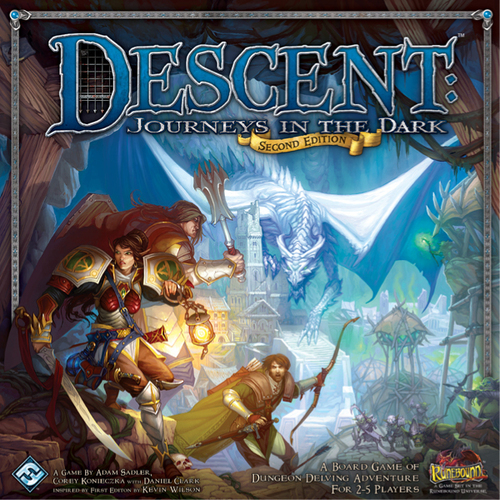Descent is basically D&D with none of the roleplaying elements and a streamlined combat system. Each game, or quest, pits a group of heroes against the Overlord as both sides struggle to progress their objectives and foil their enemy's plans. Objectives range from simple kill missions to scenario specific goals, like lighting all of the beacons to alert the castle guards of an assault. While it's true that there is no roleplaying, the simple stories that unfold really make these games feel purposeful, which isn't always the case with dungeon crawls. This sense of story is only heightened during campaign play and this is where the game really shines.
Like D&D, the heroes have four archetypes to choose from: Warrior, Healer, Mage, and Scout. Each archetype then has two classes to choose from. Warriors can choose to be a Berzerker or Knight; Mages, Runemaster or Necromancer; Scouts, Wildlander or Thief; and Healer, Disciple or Spiritspeaker. These options cover most of the standard options in fantasy roleplaying games and do offer a considerable amount of choice to the player, as each has their own unique skill tree. One of the most exciting parts of campaign play is using the accrued experience to purchase new skills.
 |
| The detail of miniatures is pretty high, particularly for the heroes. |
The Overlord also earns experience. In addition to controlling all of the monster on the map, the Overlord has a deck from which they draw traps, events, and other effects to tip the odds in their favor. As the Overlord gains experience, they can purchase new cards and further customize their deck.
| The board is assembled from interlocking tiles. There are A LOT of tiles. |
One of the things I really liked is that dedicated healer's are not a necessity, which is almost never true in D&D. If the Overlord reduces you to 0 health, you can spend a turn to Stand Up, recover some health, and you're back in the fight the following turn. Without a healer, the number of knockouts tends to snowball, but smart players can prevent the initial KO from happening by avoiding unnecessary fights and focusing on the objectives.
Interested parties may be put off by the price. $80 for a board game is expensive, but between the sheer number of high quality components and the replay value, there is a huge bang for your buck. The game comes with 20 quests, but there is a lot of room for customization for creative players. By comparison, a set of the core rulebooks for D&D or Pathfinder is going to run you a little more, and, if you enjoy the tactical elements of those games you can't go wrong with Descent: Journeys in the Dark.


No comments:
Post a Comment